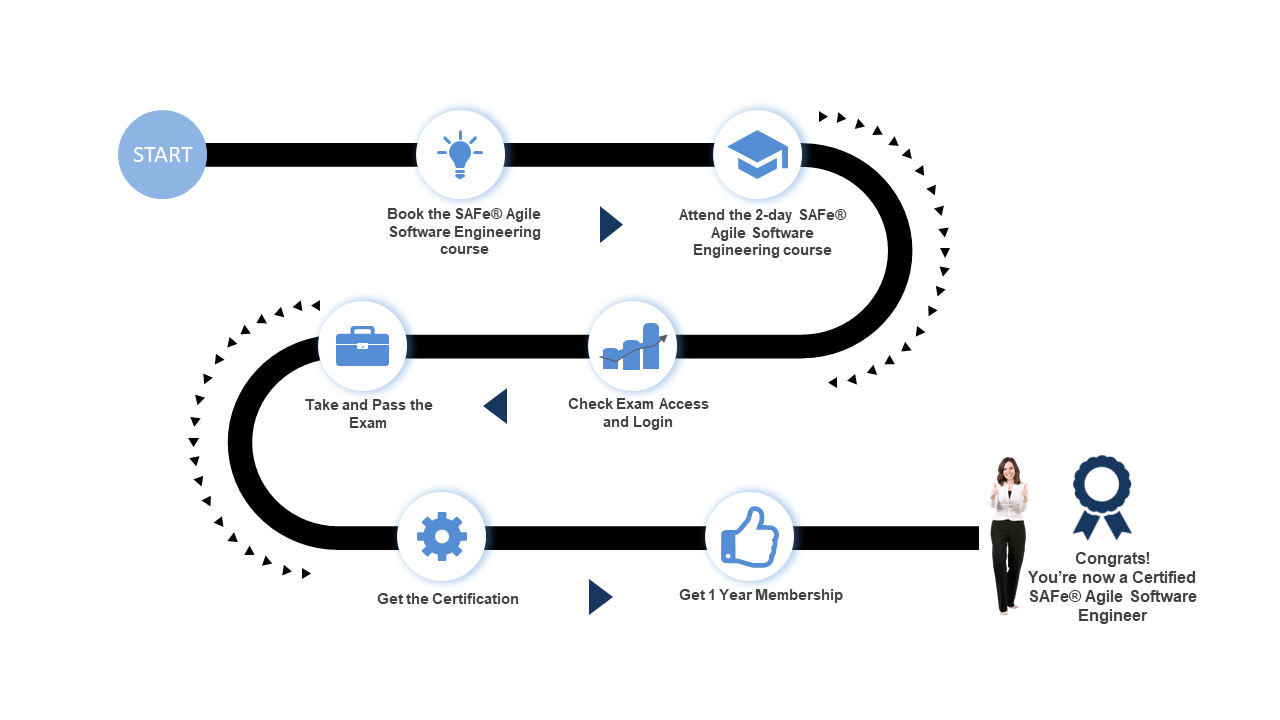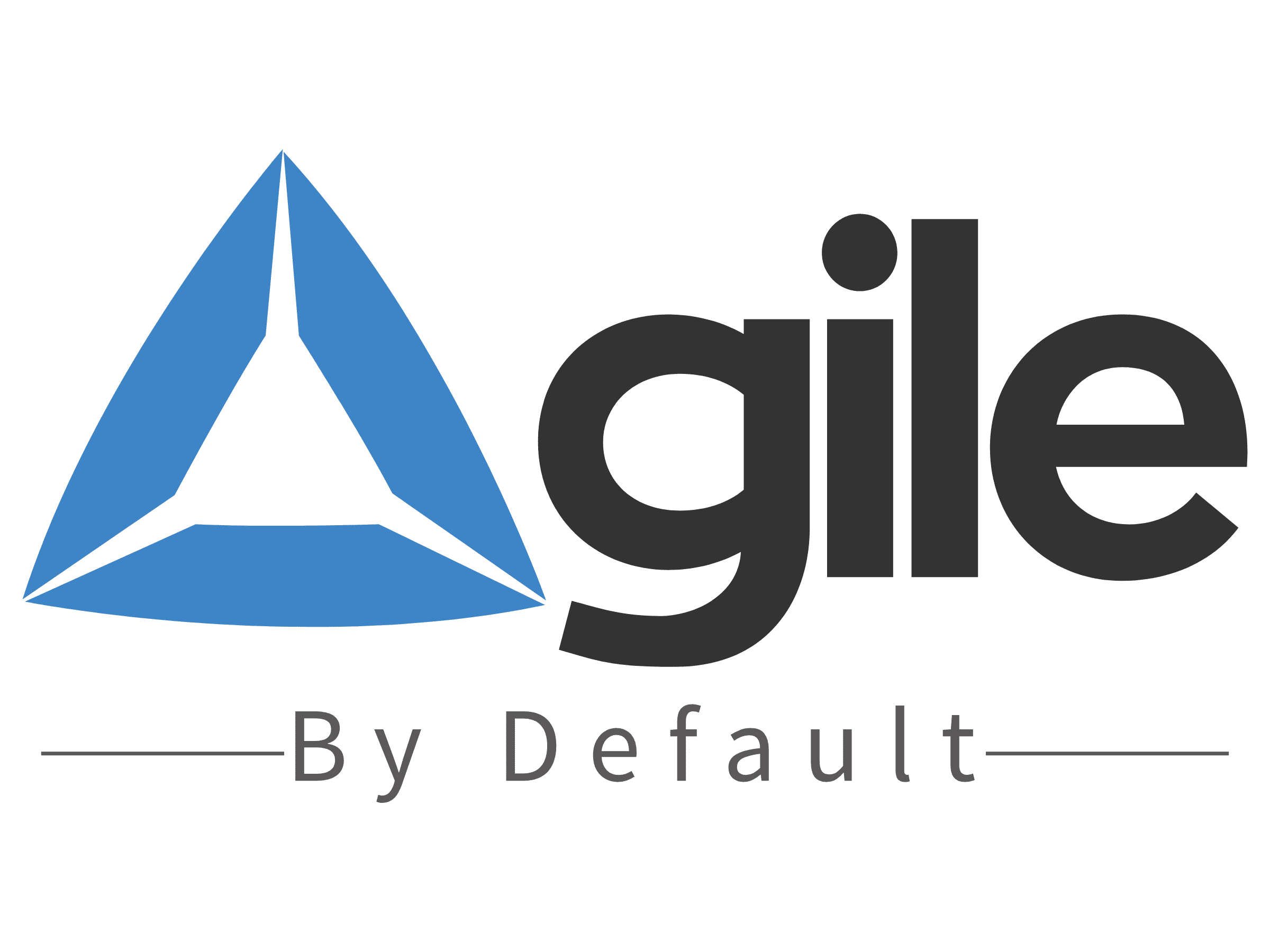Email us
Call us
Chat with us
What is this course all about
Course Overview
The discipline of software engineering has evolved with the introduction of Lean-Agile and DevOps principles and practices. New skills and approaches help organizations deliver software-centric solutions faster, more predictably, and with higher quality.
During this three-day, workshop-oriented course, attendees learn:
- The foundational principles and practices that make up the Agile Software Engineering discipline.
- How continuous flow of value delivery and built-in quality are enabled by modern practices including XP technical practices, Behavioral-Driven Development (BDD), and Test-Driven Development (TDD).
- Proven practices to detail, model, design, implement, verify, and validate stories in a SAFe Continuous Delivery Pipeline.
- Practices that build quality into code (abstraction, encapsulation, intentional programming) and designs (SOLID, Design patterns).
- Understand how Software Engineering fits into the larger solution context and their role in collaborating on intentional architecture and DevOps.
Choose from one of the dates below or connect with us for a custom date:
Join us for an Engaging and Practical experience!
What outcomes can you expect from this course
Learning Goals
What you’ll learn
Attendees learn the foundational principles and practices that make up the Agile Software Engineering discipline. Attendees learn how continuous flow of value delivery and built-in quality are enabled by modern practices including XP technical practices, Behavioral-Driven Development (BDD), and Test-Driven Development (TDD).
Attendees learn proven practices to detail, model, design, implement, verify, and validate stories in a SAFe Continuous Delivery Pipeline. They will know the practices that build quality into code (abstraction, encapsulation, intentional programming) and designs (SOLID, Design patterns). Attendees also understand how Software Engineering fits into the larger solution context and their role in collaborating on intentional architecture and DevOps.
Topics covered
- Introduction to Agile Software Engineering
- Connecting Principles, and Practices to Built-In Quality
- Accelerating Flow
- Applying Intentional Architecture
- Thinking Test-First
- Discovering Story Details
- Creating a Shared Understanding with Behavior-Driven Development (BDD)
- Communicating with Models
- Building Systems with Code Quality
- Building Systems with Design Quality
- Implementing with Quality
What are the steps to become a SAFe Agilist
SAFe Agilist Journey

WHY YOU SHOULD become A SAFE® AGILIST?
Nurturing Lean-Agile Mindsets
Nurturing Lean-Agile Mindsets
A Certified SAFe® Agile Software Engineer (ASE) applies Test-First principles to create alignment between tests and requirements, communicates with Agile modeling, creates shared understanding with Behavior-Driven Development (BDD), builds applications with code and design quality, and applies Lean-Agile principles to optimize the flow of value.
Key areas of competency
- Define Agile Software Engineering and the underlying values, principles, and practices
- Apply the Test First practice to create alignment between tests and requirements
- Utilize the test infrastructure
- Create tests with Behavior-Driven Development (BDD)
- Outline models for communication and representation
- Design from context
- Build applications with code and design quality
- Collaborate on intentional architecture and emergent design
- Create an Agile software engineering plan
- Create Minimum Marketable Feature (MMF)

Who will benefit from attending this course
Suggested Participants
Prerequisites
All are welcome to attend the course, regardless of experience. However, the following prerequisites are highly recommended:
- Understanding of SAFe for Teams
- Background in engineering, development, managing development, or quality assurance
Who will benefit?
The following individuals will benefit from this course:
- Scrum Masters
- Software Developers, Software Engineers
- Agile Coach and Consultant
- Senior Managers
What will attendees get as part of this course
Attendees Basket
What you get?
Class registration includes:
- Student Workbook
- Preparation and eligibility to take the exam
- One-year membership to the SAFe Community Platform
- Certification of completion
- Certified SAFe 5 Agile Software Engineer certification upon passing of exam
- One Certification exam attempt (re-takes at an additional fee)
Attendees must attend both days of the course in order to be eligible for the exam.
What does the certification include?
Becoming a Certified SAFe® Agile Software Engineer requires an exceptional range of skills and is a career path for many Software Engineers. Certification includes:
- Certified SAFe® Agile Software Engineer PDF certificate
- Certified SAFe® Agile Software Engineer digital badge to promote the accomplishment online
- One-year membership to the SAFe Community Platform, which includes access to the ASE Community of Practice
- Access to Meetup groups and events that provide connections to other certified SAFe professionals
- A variety of learning resources to support certified professionals during their SAFe journey
What are the details for the related exam
Exam Details
Exam prerequisite skills
- Understanding of SAFe for Teams
- Background in engineering, development, managing development, or quality assurance
Exam requirements
The first step toward becoming an Certified SAFe® Agile Software Engineer is to attend the SAFe® 5 Agile Software Engineering course. This is a requirement, because attending the course provides access to all the study materials and the exam.
Exam details
- Exam name – SAFe® 4 Agile Software Engineer Exam – or – SAFe® 5 Agile Software Engineer Exam
- Exam format – Multiple choice; Multiple select
- Exam delivery – Web-based (single-browser), closed book, no outside assistance, timed
- Exam access – Candidates can access the exam within the SAFe Community Platform upon completion of the SAFe® 5 Agile Software Engineering course
- Exam duration – Once the exam begins, candidates have 120 minutes (2.0 hours) to complete the exam
- Number of questions: 60
- Passing score – 42 out of 60 (70%)
- Language – English
- Exam cost – First exam attempt is included as part of the course registration fee if the exam is taken within 30 days of course completion. Each retake attempt costs $50.
- Retake policy – Second attempt on exam (first retake) can be done immediately after first attempt. Third attempt requires a 10-day wait. Fourth attempt requires a 30-day wait.
Exam study materials
The exam is designed to measure knowledge and skill related to the job role. We highly recommend candidates use a variety of resources to prepare for this exam including:
- Course materials – The course materials are an essential artifact from the course and can be downloaded from the SAFe Community Platform. These materials can be used to refer back to the content that was presented during the class.
- Study guide – This comprehensive guide details the job role and all resources related to the exam, including a detailed reading list. Access is available through the Learning Plan in the SAFe Community Platform upon course completion.
- Practice test – The practice test is designed to be predictive of success on the certification exam,* and it has the same number of questions, level of difficulty, and time duration. It is part of the Learning Plan in the SAFe Community Platform and can be taken an unlimited number of times at no cost. *This is not the actual exam, and passing it does not guarantee success on the certification exam.
- Sample Questions – A web-enabled, flashcard style version of the sample questions can be found online and in the study guide.
Professional Development Units & Scrum Education Units
PDU's and SEU's
Professional Development Units (PDUs) and Scrum Education Units (SEUs)
Attendees may be eligible to apply for 15 PDUs toward their continuing education requirements with the Project Management Institute (PMI) for PMP, PgMP, and PMI-ACP certifications.
Attendees may be eligible to apply for SEUs under Category C, toward earning or renewing their CSP through Scrum Alliance.
Annual Renewal
Membership renewals are one year from the date certification is earned.
• Renewal fee: $100



